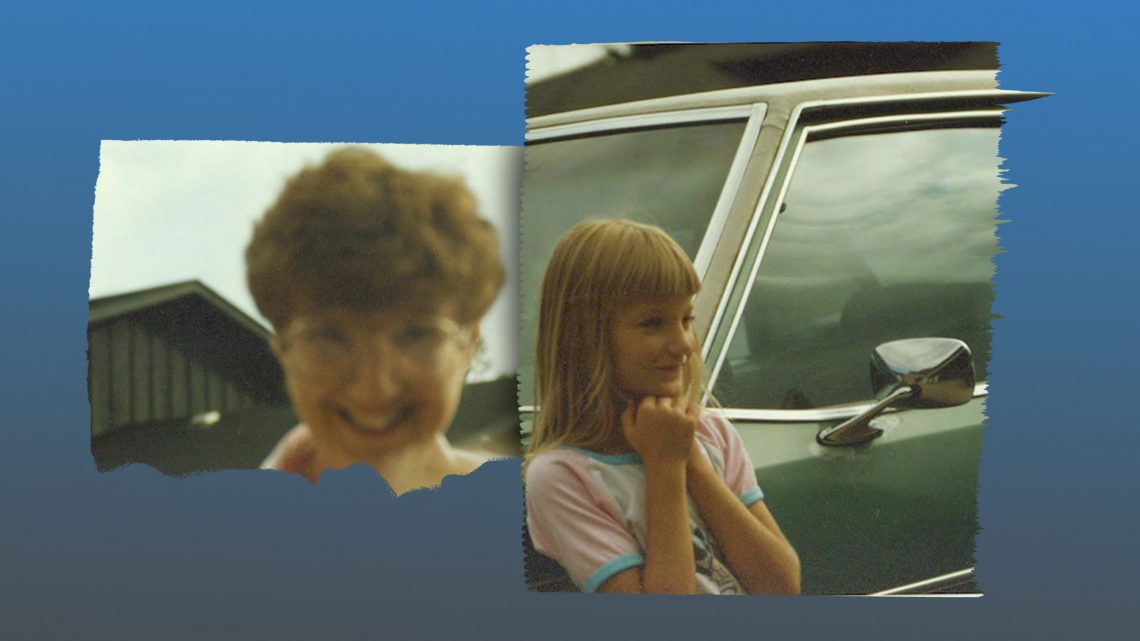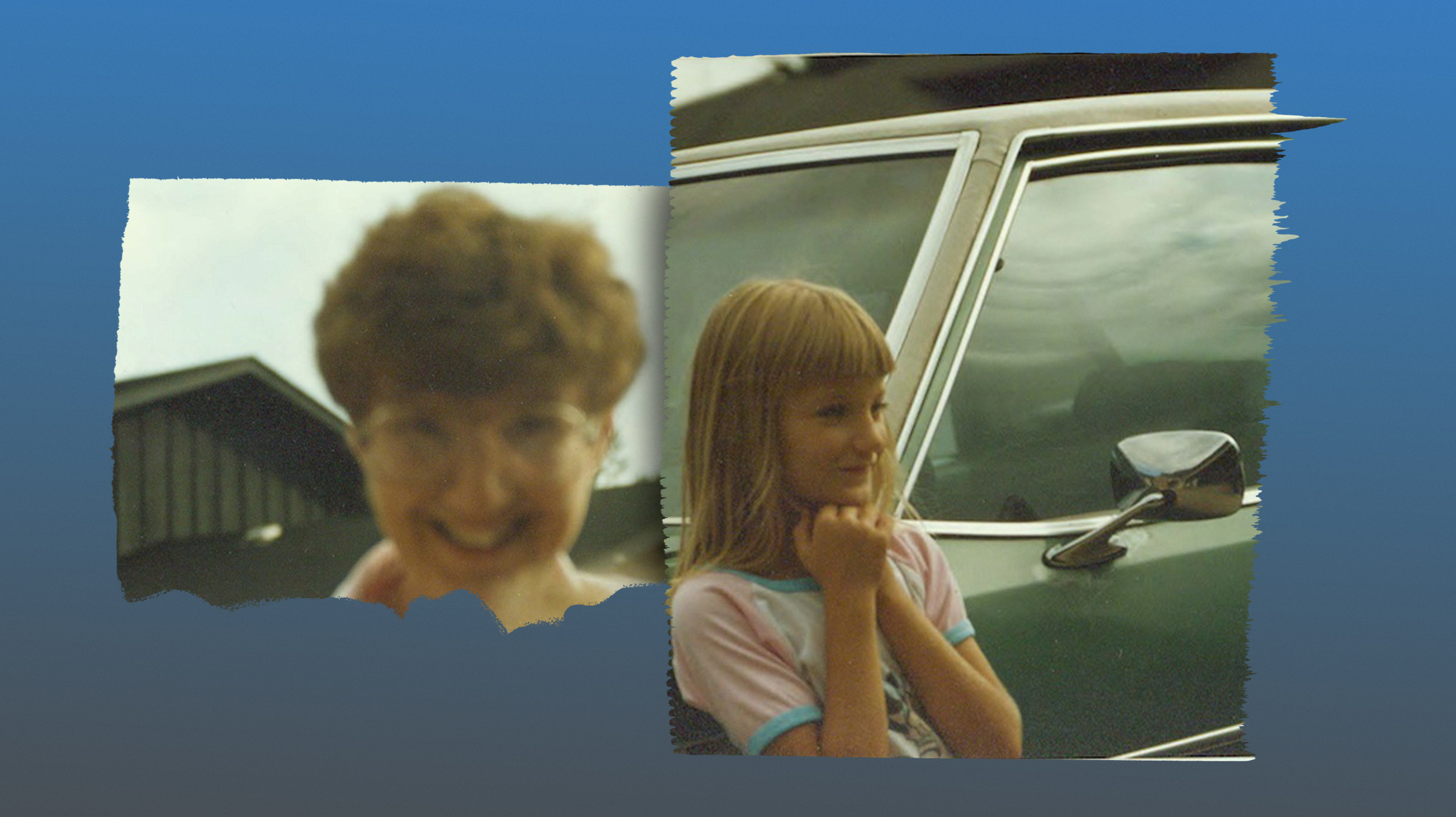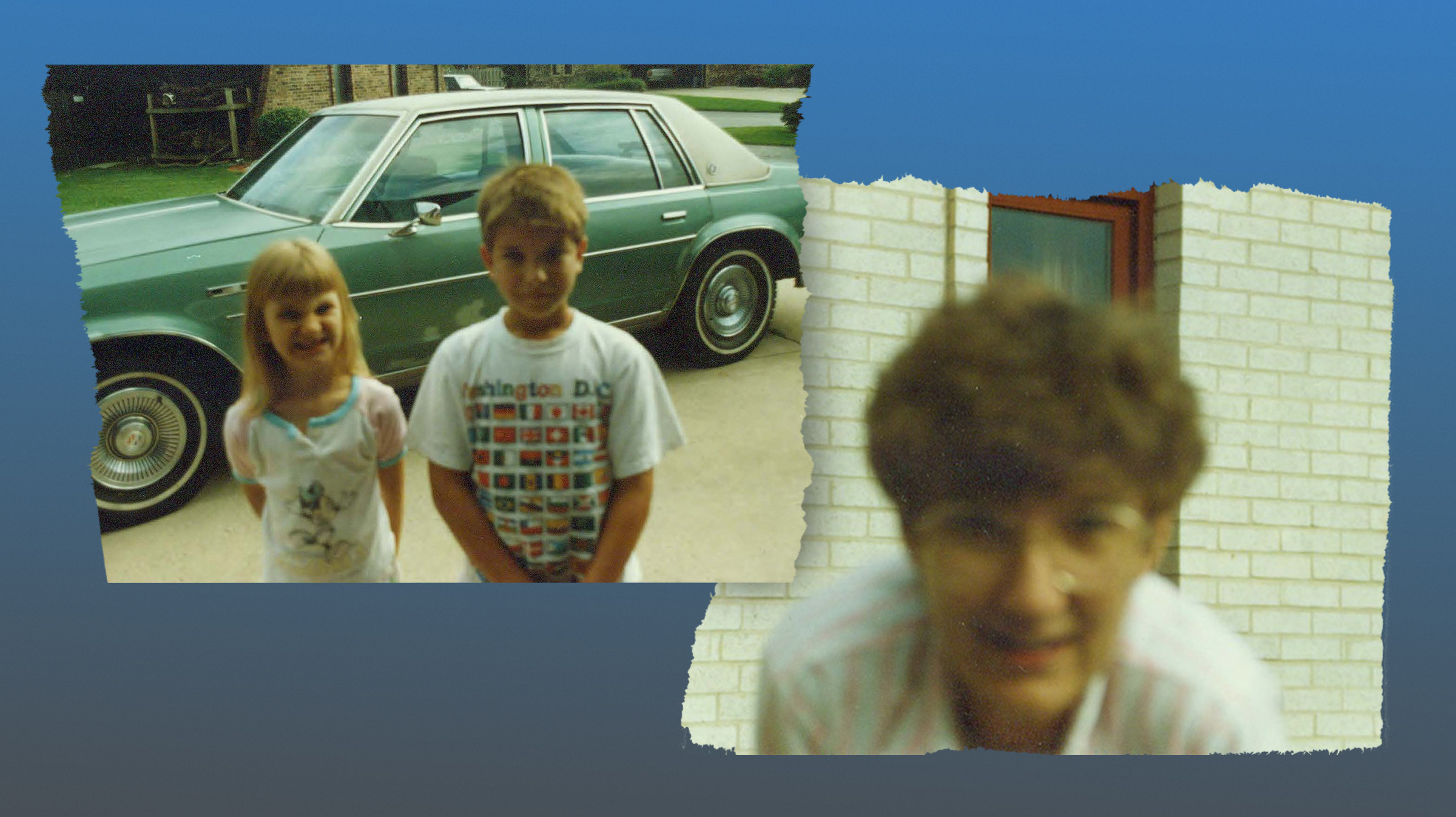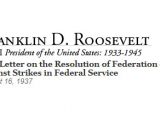
The Things I Can’t Ask My Mother
June 30, 2018My older siblings never told me about my mother proposing to her girlfriend when I was ten years old and I guess I never asked. A few Thanksgivings ago, my mother said, “Wait, you’ve never heard this story? Let me tell you.”
She said it was more like a fight, the way she proposed.
“WELL? Are you going to marry me or not!”
I admired her confidence. So they got “married.” As much as a lesbian couple could while living in Chicago in the 1990s.
“A slip of paper. Two gold bands. It doesn’t mean much,” she said and shrugged.
At first the wedding was all planned out, visions of grandeur, but everything ended up being too expensive and neither of them had money. So they did it on a whim.
“It was pride weekend in Chicago. We had a small ceremony with eight other gay couples.” As my mother spoke, I envisioned grocery store cake and flowers, hugs, laughter. They didn’t have champagne or drinks. Of course they didn’t; they met in rehab.
Or did they meet in the halfway house my mother ended up at after detox? That’s another thing I wasn’t sure of: how they met.
Nobody was invited to the ceremony other than my combat boots–wearing sister, the only of us five siblings to grow up with them. My father kicked her out for shaving her head and bringing another girl to prom. This was a move so bold in our small Indiana town I still got shit for it a decade later when I became a freshman.
"Well,” I said to my mother, “you should do it again. Renew your vows? An anniversary? Have a party so all your friends and family can celebrate it.”
I imagined myself throwing them a party. I had never done a single thing ever for my mother, maybe this could be it. After all, I barely knew her. Well... barely know her. We’re still alive and moving.
But she threw her hands up, looked at her partner and said, “Psshh. She would never do it.”
Her girlfriend of 25-plus years didn’t deny it.

For most of my early childhood, I had no idea my mother was gay. Even though she shared a bedroom with her “roommate” in their two-bedroom apartment. Even though there was a giant rainbow banner hanging in that shared bedroom with pink triangle pins decorating it. Even though they shared a purple pickup truck. Even though she took us sporadically to a non-denominational church where I watched two stunning drag queens perform The Vagina Monologues at the annual spaghetti dinner.
And then there was this photo of them almost kissing on the shelf in her living room I often studied, wondering what it meant. Nobody told me and as a child, I just accepted my surroundings.
Sometime in middle school, it dawned on me: My mother is gay. This is her girlfriend, her partner. This is her wife, but not really, not legally. I never said it out loud to anyone and no one said it out loud to me but I knew.
The 90s were a weird time to grow up with a gay mother. I had never met anyone like me and it wasn't something you saw on TV as it is today, where families are now purposely diversified. This was right around when Ellen DeGeneres simultaneously made pop culture history and sidetracked her career by coming out on her own sitcom. Laura Dern, who played her love interest, couldn’t get a job for a year after kissing her on air. Even Oprah got backlash, just for inviting Ellen onto her show to explain to angry viewers that it’s OK to be gay.
When I realized my mother was gay, I wasn’t ashamed but I did have an overwhelming sense that I had to keep it to myself.
My combat boots–wearing sister, she has always referred to my mother and her partner as her “moms.” I grew up with my father, so it felt different for me. Instead of having two moms, I felt I had zero. I thought of my mother’s partner more as a distant aunt. My mother felt like a distant aunt too. Two women we saw sometimes and ate cheesecake with. Two women who occasionally took us to the zoo or a Cubs game.
When I was lucky, others filled the role for me: my grandmother, my older sisters, a revolving door of housekeepers, the well-meaning mothers of my friends.
I’ll never forget how my friends took for granted those well-meaning mothers of theirs and how lucky they were to have them.
I’ve tried to write this story a million times but it’s so complicated, so fuzzy. I was five the day my mother left. She piled her children into a van and drove across town. I remember this perfectly though: she parked in front of a plain brown apartment complex and said, “This is my new home.”
I’ve told this story to fewer than six people and now I’m telling it to you.
“This is my new home.”
I can’t imagine what that drive felt like for her: her children in her car, the younger ones mostly clueless. Did that drive last a thousand years? What was she thinking? Did she cry? Did she turn on the radio to distract herself?
I was too young to know my mother had been struggling with addiction her entire life, too young to know she’d been slowly moving into that apartment for months now, plotting to break the news to my father at one of her therapy sessions. In the end, they got in a fight and she stormed out, telling my oldest sister to let him know she was leaving for good.
“What a terrible thing to put on a 17-year-old,” she recalled once to me in a letter.
The reason we were in that van in front of her new home was because my mother had finally chosen to get clean and get her life together. In her process of finding sobriety, her therapist lightly suggested she might be a lesbian but my mother protested the idea for a long time.
She said this was an impossible concept to grasp; there was no such thing in her world.
I don’t remember going inside her brown apartment building that day, but I remember the drive back to our house, returning to our cul-de-sac in our cushy Indiana neighborhood. My brother and I didn’t stop crying for hours. He ate an entire box of Oreos and threw up all over his bed. I stayed in the living room and watched the street from the front window, waiting for her to come back.
Sometimes, I feel like I’m still waiting.
I don’t need anyone and nobody needs me. That was the unspoken lesson I learned from my mother growing up.
My mother surprised me with a photo album the day after she told me her proposal story.
“This is from our ceremony.”
The photos were very, very 90s. I was shocked to see her girlfriend had chosen pink leggings and a black overcoat as her “wedding dress.” She was radiant: Her shiny, blonde hair fell down to her waist. Still somewhat traditional, my mother was more of the groom, with khaki slacks, a white button-down shirt, and sea-foam cummerbund. The smile on my mother’s face, the look in their eyes, was like no other.
I studied the photos for a long time. I thought about what 20 years could do to a couple. I thought about her blood running through me and what that meant. I sometimes worry all I’ve inherited is her sadness. Her insecurity. Her irrational fears. Her inability to be really close to someone.
I don’t need anyone and nobody needs me. That was the unspoken lesson I learned from my mother growing up.
I put the wedding album down and looked at the two of them before me, my two “mothers” with their matching pullover sweaters, (hers was navy, hers was gray), their white sneakers from Payless, the red puffy coats they got in the mail from cashing in Marlboro bucks. I wondered what being together meant to them now. Did my mother figure it all out? Were they still in love? Or were they going through the motions? Was the uphill climb worth it?
These are questions I can never ask her.

Last year, I was at a fancy cocktail party when I became enamored with an elegant older woman and her handsome husband. The energy between them felt like lightning bugs in a jar on a hot summer night. Like a flower coming up through a crack in the sidewalk.
I asked her, quite seriously: “How do you stay in love with somebody for so long?”
I had just broken up with my boyfriend and was positive I would never fall in love again. I thought it a miracle someone loved me to begin with, even if that someone was a shitty person.
The elegant woman left me and walked around the party exchanging pleasantries with other guests; soon I had almost forgotten about her.
At the end of the evening, she returned to me and said: “I have the answer to your question.”
She leaned into my ear and whispered, “Choose wisely.”
The timelines are blurry for me, but when I was six or seven, my mother filed for legal separation from my father and there was a custody battle. He’s never spoken to me about it but I can only guess he was bitter, shell-shocked to be left for another woman.
Legend has it he disappeared into a mental institution for a week and came back with small coin purses and keychains he had sewn for us in art therapy while there. At least that’s what one of my sisters told me. She vividly remembers those coin purses. I was so young I’ve made her memory my own. That happens with siblings. You stitch the past together for each other.
When I think of those coin purses, I feel embarrassed, desperately sad for him. I thought at the time he had gone on vacation to Mexico. Who told me he had gone on vacation to Mexico?
Another story I heard was my father’s lawyer strategically moved the custody hearing to a court in a small Indiana town with a super-conservative judge. My mother’s lawyer told her not to even bother showing up. She was a recovering alcoholic and drug addict and now she was homosexual. On paper, my father was the right choice: an educated white man, a doctor. In reality, he was abusive, absent, someone we were afraid of. He left his blank prescription pads around the house for years.
Those prescription pads were like a message to my mother. They said, You’re not strong enough to leave me.
Her lawyer was right. She wasn’t granted shared custody. She was allowed “limited, supervised visits” with her children. Supervised because the judge unofficially ruled we were unsafe with her due to her drug/alcohol abuse and her sexuality. I don’t know my mother well but I do know that if she were there that day she would have told the judge to fuck off. I still want to go into that courtroom and tell the judge to fuck off.
How different would life have been if we had a less homophobic judge? A less cruel father? Who would I be now? Who would my mother be?
Instead of being angry at the judge, my mother felt defeated. She didn’t feel she deserved her kids and now the court didn’t think so either.
I don’t know how she didn’t start drinking again.
There are two conflicting things I know about my mother.
One is she would do anything to protect her children. When I was a toddler, I somehow broke my arm. The doctor leaned in to examine me and without warning pulled my arm hard to reset it. I screamed so loud my mother punched him.
Another time, my brother was fussing with his food at dinner and my father got mad and knocked him out of his chair. As my father walked away, my mother totally lost it. She jumped on his back and held a knife to him.
He shouted, “Are you crazy???” as he pushed her away.
“I guess I was,” she later wrote to me, but added her therapist assured her she was just being a mother.
The other thing I know about my mother is she ran. She would write vague notes and disappear, leaving the family frantic. She’d drive as far as she could, usually somewhere around Indianapolis. She never had a plan and didn’t even bring money. Every time, she realized she couldn’t escape from herself. Eventually she’d run out of gas, get on a payphone and call home, asking for the credit card number so she could drive back.
Maybe that was the problem: She was always fighting for and running from her children at the same time. Always coming and going.
Her absence just as strong as her presence.
Her choice was both simple and difficult: leave her children by dying of an overdose or leave her children to get sober.
I don’t have many childhood photos but what I do have are three photo albums of pictures from the same day. All of us kids are on the porch of our house that was no longer my mother’s house. Back then, a photo album was a real investment, a real effort. You had to buy the film, you had to drop it off and wait for it to be developed, which wasn’t cheap, by the way. Then you were stuck with whatever blurry photos you got back and pasted them into a book to give to someone. I don’t know how, but I ended up with all three brown books generically titled “Photo Album” in faded calligraphy.
My siblings and I look muted in the photos, forced and awkward. I remember my sisters refusing to smile for the camera. I’m wearing Hawaiian shorts and a Minnie Mouse shirt, my bangs trimmed crookedly, my feet bare like a lazy kid. I remember my mother waving with a cigarette in her hand, leaning against my grandmother’s olive car. I remember her smile, how well it hid such a heavy heart.
My brother later told me that was the first day she got to see us after the custody battle, her first “supervised” visit.
That’s why there were so many photos.
Somewhere down the line, the custody agreement changed. When we got to visit her more regularly, she was still shaken up. She had started her new life as a gay, sober woman. She was figuring out how that made sense with being a mother. She once told me she always wanted a dozen children because she wanted to treat them better than she was treated as a child by her own alcoholic father and absent mother.
She wondered about her choices and if they were worth it. Her choice was both simple and difficult: leave her children by dying of an overdose or leave her children to get sober.
What I think she didn’t expect was the one thing she could never recover from: guilt. Her guilt has been a thick wall between us my entire life, a wall that left me on my own, wondering about my own self-worth since I was five years old.
When we visited her in that brown apartment, she’d forgotten how to act around her own kids. She bought a parakeet with yellow feathers thinking it would lighten the mood.
The parakeet died a week after that. My mother later told me she thought to herself: How can I take care of these children, I can’t even keep a bird alive.
A few months after she moved away from my father, my mother relapsed in that same apartment that was meant to save her. She stopped going to work, where she prided herself on being a drug counselor secretly abusing drugs. “Sick thinking” is how one of her letters described it. She had learned how to drink while taking antabuse, a drug that is supposed to make you very ill when combined with alcohol. A colleague or friend found her at home, drunk, and sent her to detox.
On Thanksgiving, of all days, with no place to call home and no steady paycheck, my mother was forced to move into a halfway house in Chicago where she was watched 24-7. She stayed clean, though, and that was when she met her girlfriend, her partner, her now-wife. Somehow, she had climbed from rock bottom to in love, but with my poor mother, nothing was ever easy.
When the halfway house found out, they were kicked out. All they had was an air mattress, a little bit of borrowed money, and each other when they were thrown out on the street.
A few years ago, gay marriage was legalized in Indiana, and then the rest of the country. Even though my relationship with my mother never turned out the way either of us would have hoped, I cried and cried that morning as my social media was flooded with excitement. #lovewins was the hashtag. I felt proud for her. I felt proud for everyone.
I thought of my best friend, who came out of the closet to me on prom night. How he struggled in high school and college because of his sexuality. How he got harassed on the street and in class. How people treated him like he wasn't even a person. How he overdosed a couple of years later. How his father killed himself ten years after because of grief. I wish he could’ve been alive to see how far we’ve come.
A woman from my hometown named Niki Quasney and her partner Amy Sandler are a major part of the reason gay marriage was legalized in Indiana. Niki was diagnosed with ovarian cancer and before she died she wanted to be sure her partner would be listed on her death certificate as her spouse, whom she married in Massachusetts. She wanted to know her wife and children would be recognized as her family and receive the same benefits as anyone else. She fought tooth and nail, never giving up, to try to force Indiana to recognize her marriage. Mike Pence, the governor at the time, fought just as hard to stop them. It wasn't until she was gravely ill that a federal judge finally granted her emergency request to have her marriage legally recognized. Niki passed away less than a year later as a hero to us all. Marriage was legalized in the same state that had once suggested my mother was dangerous to her children for being gay.
Soon after, my mother and her girlfriend were married officially. I didn’t get to throw them a celebration or a party. My combat boots–wearing sister, all grown up into a beautiful woman with the kindest heart, didn't get to act as their witness. In fact, they didn’t even tell us about it. I don’t know if it was like any other day or how the conversation went when they decided to officiate their relationship. I found out through a text message.
This is how my mother delivers any news, good or bad. Deaths, happy birthdays, heart surgery, grandma is in the hospital, my dog is dying, always a text message.
This text was a photograph of her marriage certificate. I later found out that they were surprised when the old man who issued the certificate apologized and said it was a travesty they had to wait so long. The bar had always been so low they weren’t used to apologies, kindness, acceptance.
There was no dressing up this time, no photograph of them together, no cake, no ceremony. The text didn’t say anything else but I could imagine her waving an arm, casually brushing it aside. It doesn’t mean much. A slip of paper, two rings.
My mother’s name was signed where the word “groom” had been whited out, as if to erase all past injustices. Finally, the law accepted her as the woman she always was with the woman she always loved and she could be a mother, too.
That slip of paper meant everything, not just for them but for us children, now adults, now able to see the bigger picture. We had proof that despite everything we had been through, we made it out OK, we forgave, and though the battle was long and hard, my mother had chosen wisely after all.
Often referred to as the poet for people who hate poetry, Franki Elliot is a street artist and critically acclaimed author of three books: Stories for People Who Hate Love (2018), Kiss as Many Women As You Can (2013), and Piano Rats (2011). Her work has been nationally recognized by Paper magazine, The Paris Review, Amy Poehler’s Smart Girls, the Chicago Tribune, LA Weekly, Time Out, etc. She currently lives in Los Angeles. Purchase her most recent book here and follow her on Instagram.


